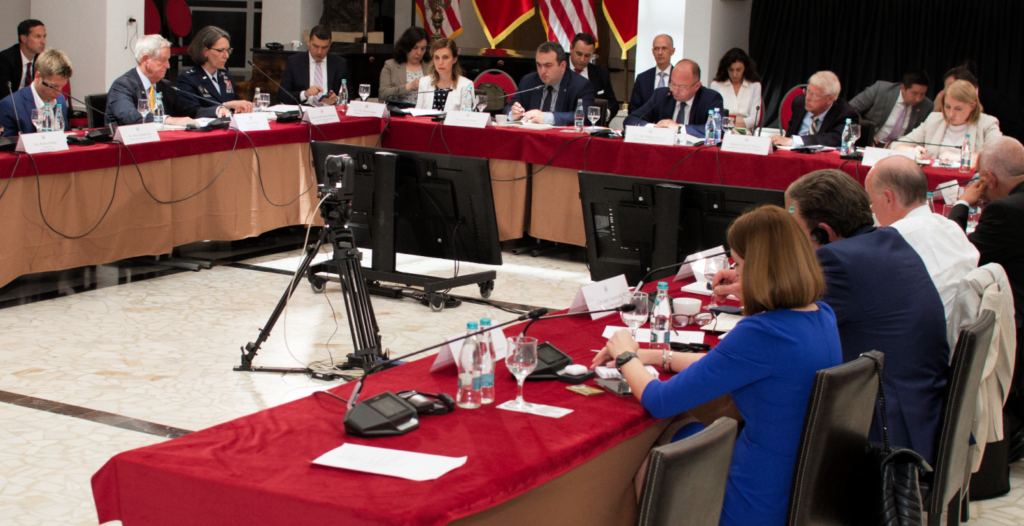WASHINGTON — Ireland’s Deputy Prime Minister and Minister for Foreign Affairs and Trade Eamon Gilmore testified before a hearing held yesterday by Rep. Chris Smith (NJ-04), Chairman of the Commission on Security and Cooperation in Europe (CSCE, also known as the U.S. Helsinki Commission).
“While today many countries in Europe are inwardly focused on economic crises, the world still cries out for global leadership,” Smith said. “Ireland has stepped up to the plate, accepting the 2012 chairmanship of Europe’s largest regional security organization, the OSCE, which does its best work in promoting human rights, democracy, the rule of law, and free elections.” (Click here to read Chairman Smith’s opening remarks.)
Smith commended the Foreign Minister for his plans—as head of the Organization for Security and Cooperation in Europe (OSCE)—to put emphasis on Internet freedom, noting Smith’s own proposed Global Online Freedom Act which would counteract the efforts of many governments (including some in the OSCE) to purchase U.S. technology to transform the Internet into a tool of censorship and surveillance. Smith noted that Gilmore’s and Ireland’s experiences in the Northern Ireland peace process could be used in working on conflicts in the OSCE region, and remarked that since the mid-1990s he has chaired 13 congressional and Helsinki Commission hearings on Northern Ireland and the peace process.
Smith told Gilmore of another issue the Helsinki Commission will be pursuing in the OSCE in 2012: international parental child abduction. Last year the OSCE’s Parliamentary Assembly passed Smith’s resolution urging the “OSCE to take up the issue of international parental child abduction,” as governments and national courts too often fail to live up their obligations under the Hague Convention. Smith also noted the OSCE’s activities in fighting anti-Semitism.
Gilmore testified before the Helsinki Commission in his capacity as the new Chair-in-Office of the OSCE. The hearing took place as Ireland begins its year-long leadership of the 56-nation OSCE, based in Vienna, Austria.
“Ireland has always attached a particular importance to the Human Dimension and we will aim to make progress in this field,” Gilmore said. “The continuing threat to fundamental freedoms and human rights in a number of OSCE participating States is a cause for real concern.” (Click here to read Minister Gilmore’s statement.)
“Our key priority in this Dimension will be Internet freedom,” Gilmore said. “As in others parts of the world, the threat to freedom of expression online is ever-present in the OSCE region and, regrettably, appears to be growing. Our intention is to highlight the simple fact that human rights and fundamental freedoms do not change with new technologies, but extend into the digital age. We will work to ensure that existing OSCE commitments in relation to freedom of expression, freedom of the media, freedom of assembly and other fundamental liberties apply to all forms and means through which they are exercised. As part of these efforts, we intend to organize a Human Dimension meeting in Dublin in June, with involvement of key stake-holders, such as civil society and ICT companies. I do not think it is an exaggeration to say that many Governments, including my own, are still grappling with the implications of rapid technological change. We can all benefit from an in-depth discussion of this kind.”
Ireland assumes the stewardship of Europe’s largest security and human rights organization faced with the ongoing crackdown in Belarus, rule-of-law backsliding in Ukraine, the unsettled political situation in Russia with presidential elections set for March, issues stemming from the outbreak of conflict in Kyrgyzstan last year and the prospect of instability in Kazakhstan.





